ANNUAL REPORT 2022









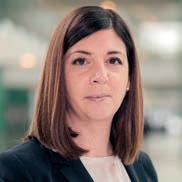




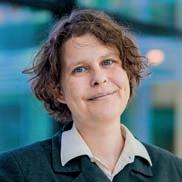




















 Elisabeth Apl
Walter Giebhart
Marion Jonas
Anna Nadolph*
Karima Rothensteiner
Bernadette Tropper-Malz
Sofia Calzola*
Lieselotte Henning
Alexander Maimer
Philip Parzer
Anna Schubert
Eva Wiesinger
Kesira Yildirim-Metz
Peter Biwald
Martina Henickl
Mierna Mahmud*
Wolfgang Oberascher
Alexandra Schantl
Verena Weixlbraun
Klaus Wirth
Birgit Frank
Nikola Hochholdinger
Dalilah Pichler
Isabella Stöckler*
Victoria Hein* Siegfried Fritz
Clemens Hödl
Karoline Mitterer
Thomas Prorok
Miriam Taumberger
Samantha Eigner*
*Student assistants, Erasmus internships, staff exchange as part of the LOGOV project
Rebecca Matsie*
Elisabeth Apl
Walter Giebhart
Marion Jonas
Anna Nadolph*
Karima Rothensteiner
Bernadette Tropper-Malz
Sofia Calzola*
Lieselotte Henning
Alexander Maimer
Philip Parzer
Anna Schubert
Eva Wiesinger
Kesira Yildirim-Metz
Peter Biwald
Martina Henickl
Mierna Mahmud*
Wolfgang Oberascher
Alexandra Schantl
Verena Weixlbraun
Klaus Wirth
Birgit Frank
Nikola Hochholdinger
Dalilah Pichler
Isabella Stöckler*
Victoria Hein* Siegfried Fritz
Clemens Hödl
Karoline Mitterer
Thomas Prorok
Miriam Taumberger
Samantha Eigner*
*Student assistants, Erasmus internships, staff exchange as part of the LOGOV project
Rebecca Matsie*


was demanding. After the effects of the Covid-19 pandemic were reasonably under control, both in terms of health policy and finances, and an optimistic outlook for 2022 seemed justified, the unthinkable happened. The Russian war of aggression on Ukraine changed everything from one day to the next. Described by German Chancellor Olaf Scholz as a Zeitenwende (paradigm shift), we have since found ourselves in a different Europe with new challenges and an unclear future. Most noticeable for all in the EU is the rise in energy costs, the collapse of established supply chains and the resulting very high inflation.
After decades of liberalisation trends in the public sector, there is now a shift towards the return of the state. This shift already began with the Covid-19 pandemic, the many different regulatory measures, and comprehensive economic and labour market subsidies. With the war in Ukraine, however, the return to the state has reached an even more far-reaching dimension.
As a result, the outsourcing of production and industry no longer works and regional European supply chains – probably at the cost of higher prices and limited European competition rules – are gaining in importance. Energy supply is once again seen as a public good and a state service of general interest organised with the participation of the ministry.
International economists call for a war economy, meaning state requirements and regulations for the production of selected goods. At the same time, the many different state measures to cushion inflation are reaching levels that are straining public budgets to an unprecedented extent. European integration and the Western model of democracy based on the rule of law and governance are also under pressure.
KDZ was affected in many ways by the ‘paradigm shift’. Our annual report refers to the numerous projects and studies on public finances and performance in Austria and Europe. But we were also increasingly concerned with the resilience and sustainability of the public sector.
For us, it was a matter of maintaining a balance under the new conditions. On the one hand, adequately incorporating the government’s new requirements related to resilience, financing, and personnel into our work. On the other hand, exercising the necessary care to avoid overstretching the public sector system and placing an unfair burden on future generations. This has been demanding and is likely to remain so in 2023.
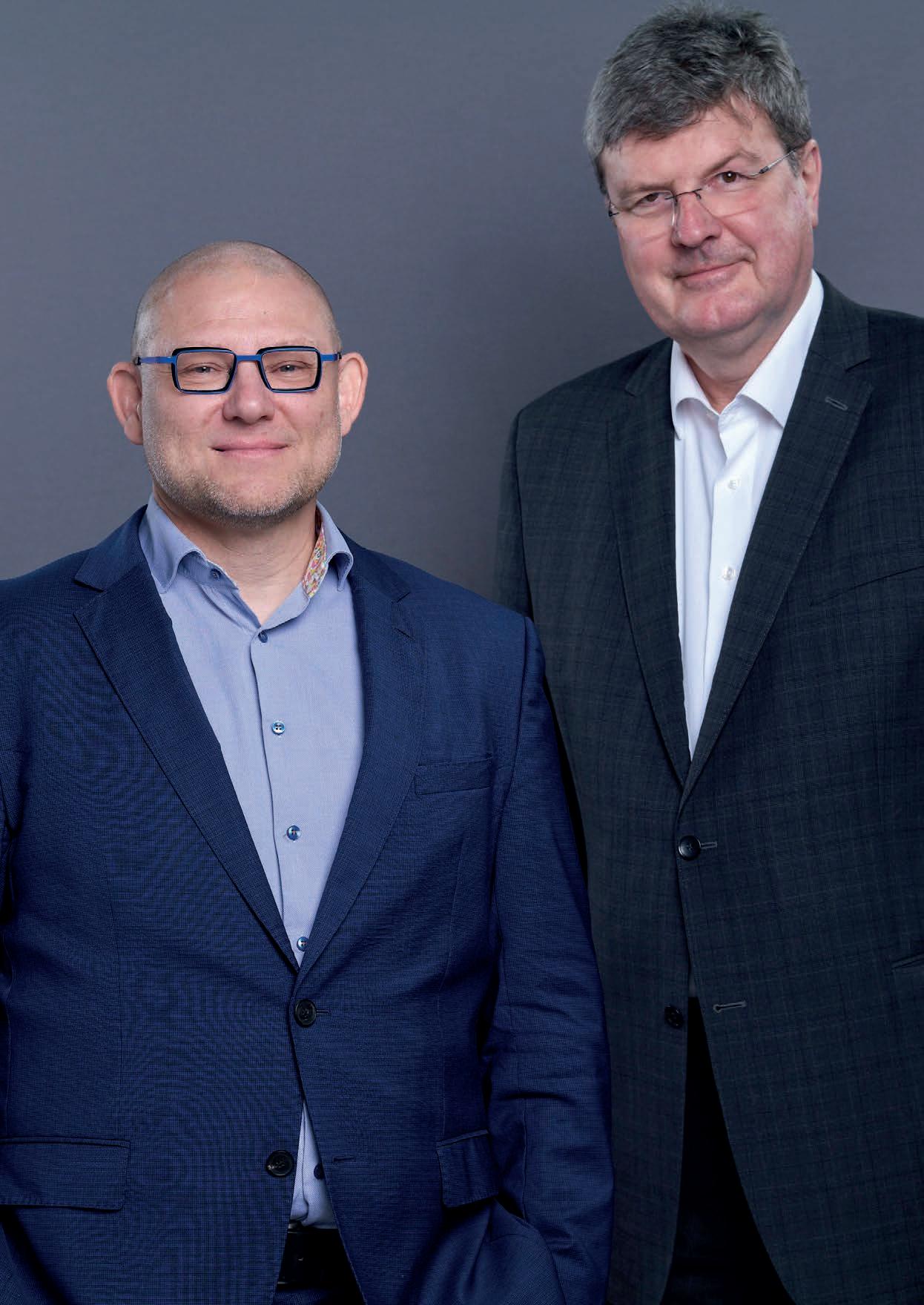
WERE COMPLETED TO THE FULLEST SATISFACTION
48 Public management consulting

31 Public finance and federalism
42 European governance & urban policy
85 EXTERNAL CONSULTANTS
137 SEMINARS & WEBINARS HELD
2,508 PARTICIPANTS TRAINED IN SEMINARS
58,291 VISITS ON KDZ.EU


SINCE 2010, WE HAVE BEEN PRODUCING THE KDZ INTELLECTUAL CAPITAL REPORT WHICH MEASURES OUR INTELLECTUAL ASSETS, GROUPED INTO HUMAN, STRUCTURAL, AND RELATIONAL CAPITAL.



The KDZ – Centre for Public Administration Research is a non-profit association headquartered in Vienna.
We are a competence centre and knowledge platform for the public sector, in particular for cities and municipalities, regions, federal government, and the European level. We think and act in a holistic and interdisciplinary fashion.
We are committed to a high-quality public sector in the areas of public management consulting, European governance & urban policy, public finances and federalism as well as training, and we develop madeto-measure concepts and solutions for them all.
Our range of services includes applied research, consulting, and training, and our expertise has been in demand since 1969.
INTERNATIONAL
We support cities and municipalities and their companies, regions, the federal government, associations, and NGOs with various issues related to financial management, organisational and administrative development, governance and management systems, citizen and customer services as well as providing support in terms of quality management and strategy development.
Individual, made-to-measure, and needs-oriented solutions help our clients harness their potential. A solution-driven approach, accuracy of fit, and feasibility are important benchmarks for us. Collaborative partnership as well as transparent and professional project management form the backbone of sustainable, trustful, and reliable cooperation.
CITIZEN AND CLIENT SERVICES
We stand for good governance, transparency, and open government in the European Union and its neighbouring countries. Good cooperation of federal government, regions, and municipalities as part of national governance is particularly important to us.

Our projects contribute to the continued development of federal structures and multi-level governance architectures, and in doing so, we also highlight the benefits of public action (public value).
As part of our focus on city and urban regional policy, we promote an intensive exchange of knowledge beyond Austria’s national borders. On the other hand, we support city regional initiatives, in the awareness that cities are also always part of the regions that surround them. Sustainability, participation, and quality in the public sector determine our action.
This is particularly evident in our commitment to the UN sustainability goals (SDGs) and the Common Assessment Framework (CAF).
We are a strong and loyal partner for the further development of public service governance and financing as part of multi-level governance.
Our goal is to bring more transparency to complex issues related to the federal state. In this context, we shed light on the financial relationships and collaboration of the players involved. Based on this, we develop forward-thinking models to optimise governance and improve collaboration in federalism.
Our work contributes to balanced and progressive fiscal equalisation as well as to the strategic further development of central task areas like nursing,
education, childcare, public transport, or climate protection. Another of our key priorities is to present Austrian municipal finances in a transparent manner and to contribute to their sustainability.

• 7 lectures
• 7 ORF interviews/broadcasts (TV and radio)
• 23 expert papers in internal KDZ formats
• 27 expert papers in external formats
• 4 published studies/publications
All the studies can be found at: www.kdz.eu/en/knowledge/studios
We have been a competent training partner for the public sector for many years. With appropriate concepts, methods, and always keeping pace with the times, our education and training work addresses the specific requirements of public administration.
The foundation of our very practically oriented training is provided by a comprehensive network of experts and a pool of highly professional lecturers, trainers, and experienced practitioners from a wide range of different administrative units.
In 2022, we were able to return to face-to-face mode in March without any significant pandemic-related restrictions and were therefore able to bring our analogous training offers back to our customers directly on site. As was to be expected after two years of mainly digital training, the demand and appreciation for this was high.
We are particularly pleased that our e-learning offers in a digital live setting (webinars via Zoom) were very well received. As a result, all throughout 2022, our customers were able to choose from a balanced mix of online and in-presence formats. All in all, we look back on a successful year of training with numerous specialist seminars, a certificate course on road maintenance, and practical forums & networking events that were very well attended and in which practical experience and specific knowledge were jointly contributed and shared.
DIVERSITY OF TOPICS: www.kdz.eu
• Economic efficiency & financial management
• Municipal budget reform (VRV 2015)
• Public management & governance
• Legal update
• Leadership
• Communication and customer management
• Innovation & digital competencies
• KDZ practice forums & networks
2,508 PEOPLE PARTICIPATED IN OUR 137 SEMINARS ALL ACROSS AUSTRIA
8 IN-HOUSE SEMINARS WERE TAILORED TO INDIVIDUAL REQUIREMENTS
53% OF ALL THE TRAINING OFFERS WERE HELD ONLINE AND 47% WERE HELD IN PERSON
33 EXPERTS WERE INVITED TO GIVE LECTURES ON SPECIFIC TOPICS
97% VERY SATISFIED AND SATISFIED SEMINAR CLIENTS










The labour market is swept clean. The list of understaffed professions continues to grow longer and is beginning to look more and more like a letter to Santa. To find new colleagues despite this and to close the growing gap fuelled, to no small extent, by the baby boomers heading into retirement, public and private employers are outbidding each other with ever more spectacular offers and incentives. Years ago, a basket of crisp apples, a parking space at the workplace or free coffee might have motivated people to apply for a job, but now the level of job incentives is soaring to new heights. The 4-day week (preferably with full wage compensation) is currently very popular, and recently – because even the 4-day week no longer seems to be a guarantee of success – some employers have gone one better and are now advertising models with widely individualised working hours.
Generally speaking, all this is right and proper. But the debate about such appeal factors obscures something much more essential to working. If this approach succeeds in gaining someone’s interest in your organisation, that is obviously important and good. But it will take more than that for these colleagues to carry out their tasks with interest and a certain degree of dedication and to enjoy coming to work every day (instead of just waiting for their 4-day week to end). The key word here is ‘purpose’: What are we here for? Why am I/are we needed? What would it be like in this world if we didn’t set to work all over again each day? Yes, it is true that some employers now advertise their vacancies as ‘work with a purpose’. But the purpose of work does not become tangible just by using the term.
In 2022, the city of Braunau tried a different tack and took a purpose-oriented approach to the question as part of employer branding. It was a very productive process. The fact alone that a discussion was taking place about the purpose of the organisation and everyone’s individual contribution drew people together in dialogue and revealed exciting potential in
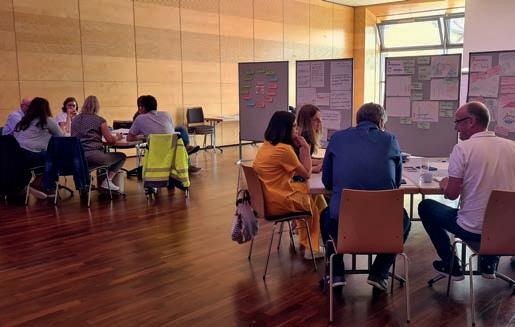
the teams. At the same time, it also became clear what it means to everyone individually to be noticed and appreciated.
At the end of the process in Braunau, an ambivalent feeling may linger with regard to the emphatic purpose-related statements. The emotional power of these statements could have an impact that reaches beyond the day itself, fostering the development of a new awareness among the employees. If this succeeds, it will mean having come a step closer to understanding the true meaning of the word profession. In this case, a person’s profession is not just a job, but something more of a calling, and a person’s daily work instils a sense of pride in what it means to be able and allowed to work specifically for this city and the people who live in it. •


Before the COVID-19 pandemic, most municipal budgets were on a good trajectory. After the financial and economic crisis of 2009/10, several years of efforts and favourable conditions (e.g. strong growth in revenue shares) had put municipal budgets back on solid ground.
In some municipalities, the COVID-19 pandemic in 2020 undid the successes achieved. The onset of the energy crisis triggered by the war in Ukraine and double-digit inflation rates additionally exacerbated the financial burden. As a result, it was necessary to renew consolidation efforts in multiple cases in 2022 to restore budget stability by 2025.
KDZ developed a three-tier implementation model for this purpose:


• Tier 1 – analysis of municipal budget 2021 to 2025 complete – status, development, and action requirements elaborated and specified.
• Tier 2 – structural problems on the revenue and expenditure side identified and potentials revealed – supported by an intermunicipal comparison.

• Tier 3 – development path to 2025 elaborated, related measures specified and central processes of optimised budget control established.
In the first tier, medium-term consolidation needs are established based on a budget analysis –generally in multiple scenarios.
A significant element of the consolidation project is a comparative look at the local conditions and specific solutions implemented in comparable cities and municipalities. The comparative process in Tier 2 comprises the following steps:

The development path is the result of Tier 3, in which the consolidation measures are specified and rated by priority. Possible areas identified are often related to staff structures, municipal real estate, and performance standards. On the revenue side, however, access to public funding is also a central factor.
The success factors are a political commitment to the scope of consolidation and the development path, the involvement of staff, and taking a broader view with the help of an intermunicipal comparison. •

Like nailing jelly to a wall’ is an idiom that often comes to mind in the context of digitalisation. However, its growing tangibility is reflected in the increasing electronic handling of workflows and processes and, just as importantly, the examination of organisational issues in the context of this change. This does not relate to software issues or questions concerning the electronic workflow in itself, but rather to developing an awareness of the following questions:
• Are long-standing organisational structures still equal to the demands of modern collaboration or do they need to be rethought?
• Do I have the right competencies in-house?
• What complementary action maxims are needed for digital collaboration?
• What should be the future design of electronic file structures?
In the context of the ever-increasing demand for support related to these topics, we were able to ‘lend a hand’ to numerous cities and municipalities last year with our ‘digitalisation projects’.
And more so – we also tried our hand, for the first time, at moulding our experiences into a KDZ seminar and presenting our tools, tips, and tricks to an interested group of participants. The response was surprisingly positive – so much so that we have included this topic in our seminar programme for 2023.
Finally, a brief look into the future – to what extent will Austria’s cities and municipalities operate digitally in the future? We believe the answer to this question is ‘extensively so’ – not only in internal administration, but increasingly digitalised infrastructure control is also particularly suited as a means of controlling these systems (e.g., heating systems) electronically according to the principle of maximum efficiency, thereby saving costs, especially against the backdrop of the current energy prices and high inflation rates.
This means that digital systems will continue to gain importance in municipalities in 2023 and in the years to come. •
SEMINAR: DESIGNING PROCESSES DIGITALLY AND ENSURING THEIR OPTIMAL IMPLEMENTATION (19 JUNE 2023)
www.kdz.eu/de/seminare/21951p1wo23
The budgets for the year 2023 show that the main areas of expenditure will increase significantly.
These include, for instance, energy, maintenance, transfers for social welfare and hospitals, and also staff disbursements. At the same time, by relation, the main areas of revenue, such as revenue shares, are increasing only slightly. As a result, the number of municipalities with a negative balance 1 (operating result balance) is rising, as a result of which these municipalities are finding themselves hardly able to service their loans or afford necessary investments.
In this context, it is often necessary to closely examine the main areas of expenditure of cities and municipalities as well as the services this expenditure is based on and the related standards. KDZ offers bespoke concepts for budget consolidation with the help of which room for maneuver can be regained for the municipal budget based on a mission-critical process.
Many cities and municipalities are finding it increasingly difficult to fill vacancies and to prevail in the face of competition.
In an attempt to resolve the issue, they rely on various measures to modernise their human resource management. However, it is not enough to concentrate only on recruiting new staff more effectively. Much more so than in the past, a focus must be on promoting existing staff, offering employees real development prospects, and also increasing the appeal of working in municipalities, for example through more flexible working time models. With this in mind, KDZ maintains a knowledge network and supports cities/municipalities in the development of their human resources management.
Digitalisation offers cities and municipalities tremendous opportunities in terms of designing more efficient and customer-oriented processes.

In this context, however, it is also important for the organisation and central processes to continue evolving, because digitising existing, sometimes unsuited, processes will not lead to the desired success and will only cause organisational problems instead.
We help get your organisation ready for digital transformation and develop your central processes together with you.
Cooperation between municipalities Cooperation between municipalities in the areas of both administration and municipal maintenance can help mitigate staff bottlenecks and increase the efficiency of service provision.
For cooperation to be successful, a detailed collaboration concept is needed that establishes areas of cooperation and the exchange of services as well as the related contributions to be made. The better the design of this cooperation concept, the more successful any cooperation will be. We would be happy to support you in this endeavour based on our wealth of related experience.
This was only a brief outline of the central topics for 2023. Perhaps we have been able to spark your interest in one or several of these topics. •
2023 WILL BE A DEMANDING YEAR –WE ARE ON YOUR SIDE












The pandemic appears to be over, and yet an end to the crisis mode seems nowhere in sight. The climate crisis, the energy crisis, or the war in Ukraine all call for a crisis response that provides enough scope for long-term thinking and innovations. For cities and municipalities this means, in particular, sustainable municipal finances that not only guarantee reliable public transport, affordable housing, good schools, or clean energy – thereby also securing local services of general interest – but that also allow investments in climate protection and climate change adaptation with a view to future generations.
A current study we published this year together with the Council of European Municipalities and Regions (CEMR) was dedicated to this topic and revealed some interesting results. For example, the local and regional authorities in Europe finance 54 percent of all public investments, while incurring only 25 percent of all public expenditure. With an average

of 73 percent, the lion’s share of these investments went to climate protection, again underscoring that the climate and energy transition can only succeed in close cooperation with the municipalities. What is also remarkable is that the local debt burden remained low and stable from 2010 to 2020, averaging 4.8 percent of GDP, while the federal debt burden soared to 67 percent of GDP by 2015 and to 81 percent in 2020. The latter seems mostly due to federal COVID-19 expenditure though.
However, being able to ensure sustainable financing also means bolstering municipal financial power with own revenue and taxes. Alongside Latvia, Poland, and Slovenia, Austria continues to rank among the countries characterised by weak local tax autonomy.
In 2022, municipal finances and decentralisation continued to be constant companions in our other international activities, too. For example, we were commissioned by the OECD to look at the structures and functioning of multi-level governance in the Western Balkans. With a colleague from the South African Local Government Association (SALGA), who was a guest at KDZ for a month, we compared citizens’ budgets in Austria and South Africa (LoGov project), and with our colleagues from the Network of European Cities for Sustainable Public Finances (CSPF project) we looked at the potential and risks of digitalisation for municipal financial administrations and the alignment of municipal budgets with the 17 UN Sustainable Development Goals (SDGs). The latter would certainly be an approach worth considering to make municipal finances sustainable. However, cities and municipalities cannot shoulder and master the extent of the current and future financial and structural challenges alone. An exit from the crisis mode will require a combined effort on all levels of government. •
From 2021 to 2027, the European Commission plans to invest 864 million euros into administrative and structural reforms in Member States. The European Commission has become a major player in administrative and structural reform within a very short space of time. In this context, the Commission relies on external knowledge, which has given KDZ the opportunity to participate in new projects and cooperative endeavours.
For instance, we supported OECD SIGMA with the continued development of the ‘Principles of Public Administration’ (OECD SIGMA 2017) with regard to the ‘municipal level’ and ‘multi-level governance’. SIGMA (Support for Improvement in Governance and Management) is an initiative of the OECD and the European Union that guides the administrative reforms of EU candidates and neighbouring countries. The inclusion of the municipal level and of multi-level governance into this European guideline for administrative reform is a first step toward extending EU- and OECD-led reforms to the municipal level and decentralising or federalising the structure of Member and Candidate States. In this context, we have elaborated a comparative analysis of municipal structures in the six Western Balkan countries for OECD SIGMA.
As a first multilateral administrative reform project, the European Commission is funding cooperation between eleven EU countries under the leadership of Belgium in the Common Assessment Framework (CAF) area. OECD and KDZ have carried out eleven case studies for the project ‘Strengthening the resilience of public administration after COVID-19 with CAF’. This allowed us to study the resilience, innovativeness, and adaptability of the Women’s Service of the City of Vienna (MA 57), the National Employment Office of Belgium, the Croatian Pension Insurance Institute, the Lubuskie Voivodeship Office (Poland), the Slovak Ministry of Environment, the Slovenian Agency for Agricultural Markets and Rural Development, or the Health Service of the City of Madrid.
In 2022, the Western Balkans ‘Regional Quality Management Centre’ started its activities. We have been working to establish this centre with our partner the ‘Regional School of Public Administration – ReSPA’ over the last few years. The Regional
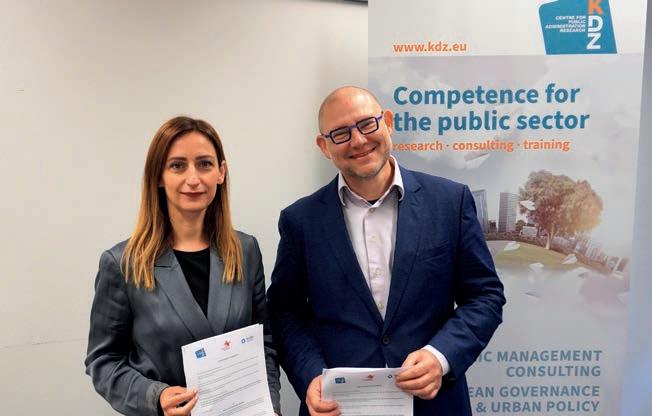
Quality Management Centre is the point of contact for all CAF questions. It supports CAF self-assessments and carries out certifications with the CAF seal of approval. The opening of the centre represents the achievement of an important milestone in the BACID project ‘Building Administrative Capacities in the Danube Region’. It will help sustainably advance the development of public administration in the Western Balkans towards EU standards. Many thanks to the Austrian Development Cooperation for supporting the project.
As part of the BACID programme, we also founded a ‘Network for Digitalisation’ with NALAS (Network of Associations of Local Authorities of SouthEast Europe). Experts from municipal associations and cities from the Western Balkans and South-East Europe are now working on measures for the digitalisation of cities and the creation of the necessary standards. In 2022, pilot projects on electronic parking management and mobile care for the elderly were developed. •


Every year, the World Bank publishes the Worldwide Governance Indicators (WGI). They provide insight into the ‘government effectiveness’ of almost all states around the world. In particular, government effectiveness measures the quality of public services and of the civil service, but also its political independence. On a scale of -2.5 to +2.5, the range within the European Union is very high, with minus 0.22 in Romania and plus 1.95 in Finland. Austria scores in the top one third with a score of 1.66.

In 2022, effective governance was a recurring theme for us in many ways. We carried out a wide range of evaluations and compared the effectiveness of government and administration both with costs and with the degree of local autonomy.
The United Nations ‘Principles of Effective Governance’ also played an important role in KDZ in 2022. These eleven principles are based on the Sustainable Development Goals (SDGs) and are intended to
support governments and public administrations in implementing the UN’s 2030 Agenda for Sustainability. We are currently integrating these principles into the Common Assessment Framework (CAF) and helping public sector organisations improve their governance and sustainability. We place particular emphasis on ‘Effectiveness’, ‘Inclusion’, ‘Accountability’, and ‘Leaving no one behind (LNOB)’.
We are particularly proud of the SDG Municipal Check for Investment Projects, which we developed together with the Institute for Environment, Peace and Development (IUFE) and the Ecosocial Forum Vienna. This checklist ensures the application of the SDGs in municipal projects using the ‘planning and operation of a public kindergarten’ as an example. The aim is for municipal investments to become generationally fair, socially fair, and ecologically and economically sustainable.
In the practice network ‚Resilient Municipalities‘, we bring together local government actors to strengthen the resilience and adaptability of cities.
With our partners at NALAS (Network of Associations of Local Authorities of South-East Europe), we are working on municipal citizens’ budgets to strengthen governance in South-East Europe. •
Advancing the internationalisation of KDZ and expanding our network are central pillars of our Strategy 2025+. The activities planned for the year 2023 are fully dedicated to this orientation.
As a result, the focus in 2023 is also on European municipal finances and structures, effective governance and European administrative reform. For instance, we will contribute to the 9th edition of the fiscal decentralisation report with a chapter on Austria as part of our BACID project. The publication of this study is scheduled for spring. Additionally, we will implement digitalisation pilot programmes with NALAS1 in the cities of Veles and Sombor.
Against the backdrop of the current financial equalisation negotiations, we will prepare central results of the current municipal finance studies by the Council of European Municipalities and Regions (CEMR) and UCLG (United Cities and Local Governments) that are relevant for Austria’s municipalities and discuss them together with the cities. We will review implications for cities and municipalities
of the European Commission’s proposals for a new EU Economic Governance Framework2 published in autumn 2022. We will be involved in two multilateral TSI projects (Technical Support Instrument of the European Commission) and will support the Federal Ministry of Arts, Culture, the Civil Service and Sport (BMKÖS) as Austrian partner.
One project will focus on customer satisfaction management, the other on in-house consulting. In 2023, we plan to initiate additional multi-country TSI projects in the area of SDGs, European municipal finances, and municipal key performance indicators. In the area of ‘effective governance’, apart from our international activities at the CAF Centre (see p. 40), we will intensify our cooperation with OECD and OECD SIGMA and contribute our KDZ expertise as a partner in the EU project WeBER 3.03 on civil society monitoring of administrative reform in the Western Balkans. •










Municipal services of general interest can be understood as the basic provision of services to citizens. In a broader sense, they range from education to culture to transport infrastructure. They also include all leisure and sports infrastructure as well as housing. Water supply, sewage disposal, and waste disposal are an important part of services of general interest.
Services of general interest are financed in different ways. Areas such as supply and disposal are financed exclusively by the users (through fees) as well as by subsidies from other public bodies – which is generally ensured even during times of crisis. Other areas, on the other hand, are largely financed by general tax revenues.
While the general conditions for services of general interest are changing continuously, their financing is not keeping pace. There are three critical aspects in particular:
• Firstly, municipal finances are generally susceptible to crisis. If tax revenues fall in the course of an economic crisis, this has a direct negative impact on the revenues of municipalities.
• Secondly, the financial flexibility of municipalities is continuously decreasing, which leads to increasing competition between the different areas of responsibility. This is due to the high levy dynamics for social services and health as well as the trend towards a decline in user financing – through free kindergarten education, the abolition of the recovery of nursing care costs (Pflegeregress), or the Klimaticket (climate ticket).
• Thirdly, the fiscal equalisation system is not resilient and needs to be reformed. Particular mention should be made of the strengthening of municipal tax autonomy as well as the unbundling and
reduction of transfer relationships between the regions and municipalities.
Fee budgets as a solid foundation
Fees continue to be an important pillar for financing municipal services. They finance core areas of general interest services such as water, sewage, and waste management. However, fees also serve to steer user behaviour in order to achieve policy goals. In terms of sustainability, such goals can be the economical use of water resources and the reduction of waste.
Cost surpluses achieved in fee budgets can also be used for other municipal areas with an internal connection to fee budgets. This offers an opportunity to set municipal finances on a solid footing. The basis for this is comprehensive cost accounting. With the KDZ fee check (KDZ-Gebührencheck), we help cities and municipalities secure the financing of general interest services sustainably. •

One crisis follows another. The past recent years have not been easy. Nevertheless, our government remained functional, which was possible only as a result of the tremendous efforts undertaken by the federal government, the regions, cities, and municipalities. But does this mean we can conclude that our federal state is climate fit?
We started the year 2022 with the presentation of our convention book on crisis-proof financial equalisation. Generally speaking, it is evident that fiscal equalisation is an important stabiliser in crises but that there is also room for improvement. We recommend financial equalisation negotiators to focus more on the goals of crisis-proof financial equalisation, to take different types of crises into account, and above all to strengthen the resilience of municipal finances.
In mid-November, we examined the issue of climate protection and climate change adaptation in greater depth at the impulse conference ‘How climate fit is ©
the federal government?’ The assessments of the participants on this topic were quite divided. Twothirds of the participants of the impulse conference stated that the federal government’s level of climate fitness is low. 27 percent said that the government had failed altogether and that it was spiraling into climate disaster. And only 9 percent had hopes that the government would be equal to the task. The focus of the event was on multi-level governance as well as fiscal equalisation. Central questions were: Is federalism in its current design suited to meeting this challenge? Where are there gaps and opportunities for optimisation? Does the financial equalisation system provide sufficient funds for this mammoth task, or what adjustments are needed in the financial equalisation system?
The challenges of the three levels are assessed differently, as the accompanying figure shows. The results of the event will be published in a convention book before summer 2023. A summary and conclusions of the event can be found on our website. •
In the year 2022, the areas of childcare and allday schools faced extensive challenges, too. They are the central pillars of a social, inclusive, and functioning society. The benefit for society is beyond dispute. Ensuring and further expanding the provision of day care represents a significant contribution to equal opportunities for children and to reconciling work and family life. In this context, KDZ has created fact sheets on elementary education4 as well as a study on the expansion potentials in school and out-of-school day care5 on behalf of the Vienna Chamber of Labour.
Initiated by several constitutional agreements on the financing of the expansion of childcare in the elementary sector between the federal government and the provinces, the offer has been steadily expanded in recent years. However, the development goals set have not yet been achieved. Recently, it became apparent that it is becoming increasingly difficult to find staff. The recent demonstrations of elementary teachers have drawn attention to difficult working conditions and low wages.
Staff management is proving particularly complex in the area of all-day schools, too. In addition to the lack of qualified staff also prevalent in this area, the division of staff competencies between the regions (learning part) and the municipalities (leisure part) raises numerous organisational obstacles. Conflicts of use, duplicate purchases, and interface problems between the regional authorities sometimes pose great challenges for the municipalities. The pooling of human resources competence in one hand could be an important first step in this context.
Currently, the different institutions in the areas of elementary education and all-day schools compete with each other when it comes to recruiting staff. That is why a comprehensive solution for the staff shortage is necessary, which includes not only teaching staff, but also leisure, after-school, and elementary teachers. Only if all the levels in the education sector are linked together and developed in a coordinated manner can the expansion goals be achieved and sufficient places ensured for all families and children, while at the same time ensuring high-quality care. •
School and out-of-school day care
2019/20 primary and secondary level
Source: Statistics Austria: KTH-Statistik 2019, Schulstatistik 2019/20
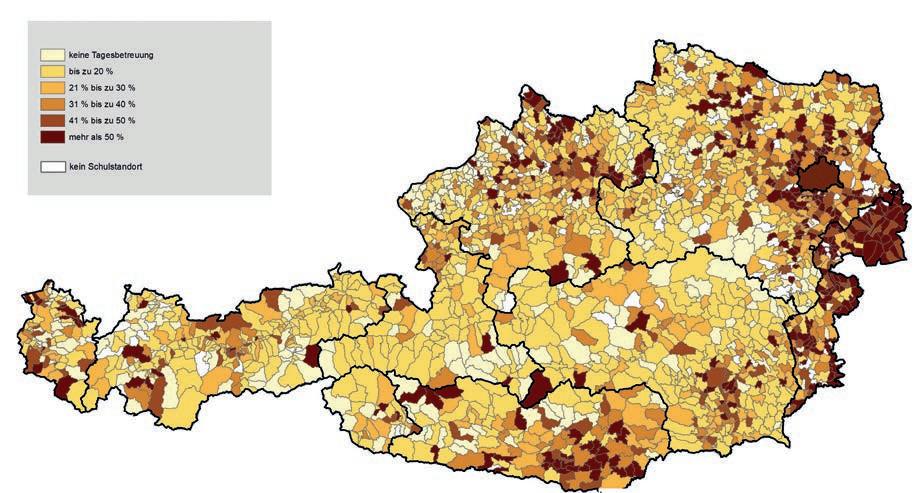
The year 2023 will be heavily focused on the financial equalisation negotiations, which must be concluded by the end of the year. KDZ will support this process with its expertise. It is important for us to present this complex matter in a transparent and understandable way – for example with our fact sheets on financial equalisation. In this way, we want to contribute to a sound basis for decision-making for the negotiating partners and present the complex matter as comprehensibly as possible to the interested public.
In terms of content, the topics of climate protection and climate change adaptation will be continued in 2023. The aim is to design the financial equalisation system in a way that will ensure that all three levels of local authority are provided with the general conditions they need to achieve the climate targets. There are still research deficits in this area, especially at the municipal level.
As in previous years, transparency and sustainability will continue to define our work. Our internet portal www.offenerhaushalt.at will be expanded to include municipal associations and we will continue the municipal financial analyses and forecasts. We want
to pay special attention to municipal services of general interest and contribute to crisis-proof and sustainable financing. •
• Recommendations on the reform of fiscal equalisation as part of the fiscal equalisation negotiations
• Connecting climate protection with financial equalisation and municipal finances (climate budget, governance structures)

• Fact sheets on financial equalisation
• Expanding www.offenerhaushalt.at
• Crisis-proof municipalities and sustainable financing (such as fees, property tax, transfer reform)
• Financing and control of services of general interest
• Strengthening regional city and multi-level governance











Ahighlight in our training and networking programme this year was the Municipal Maintenance Yard Day 2022 (Bauhoftag) in Villach. The city of Villach distinguished itself as an excellent host.
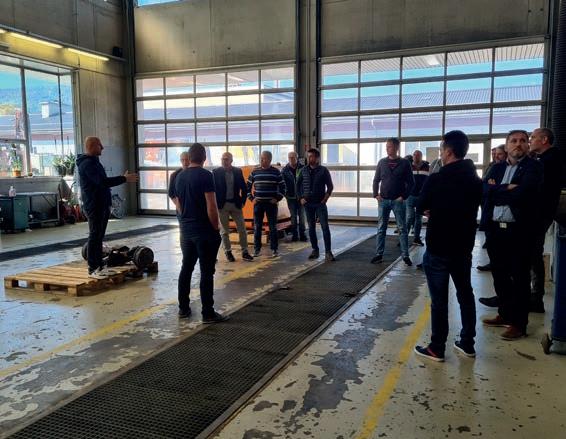
The municipal maintenance yard day was bright and sunny and kicked off for the 35 participants in the ‘lecture hall’, beginning with a review of KDZ cooperations and followed by a look into the future with a focus on digitalisation in building and business yards. The first day was rounded off with a presentation by the City of Villach on the topic of liability obligations in infrastructure management. On this occasion, the participants were able to gain insights into the extremely innovative working practices of the City of Villach and take a look at the IT tools used.
Day 2 began with the support of the Austrian Workers’ Compensation Board (AUVA) and an expert lecture on the topic of ‘Instructions as a management task’. Afterwards, the participants had the opportunity to visit the premises and the specialised workshops of the municipal maintenance yard in Villach.
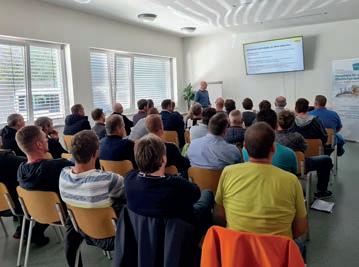
The focus was on the preparatory measures taken by the city of Villach for a possible blackout scenario. ‘Not all generators are the same,’ was the maxim. In addition, concrete strategies are needed for the worst-case scenario.
We look forward to an interesting ‘Municipal Maintenance Yard Day’ in 2023! •

Some municipalities have always received a lot of attention as a result of their favourable location, thanks to regional pioneers, or simply by coincidence. Over the course of a long time, this led to an established image which the municipality (and also the region) often benefited from: People and companies prefer to settle in a municipality with a good image – the general social atmosphere is positive because this kind of municipality ‘has something to show for itself’, it stands for one or several unique features (USP – unique selling points), and even superordinate politics shows interest in the local events.
This reputation characterises the image of a municipality in the long run. In fact, the services each and every municipality provides are very comprehensive. These services begin with the municipal services of general interest (water supply and disposal, culture, housing, public transport, streets, kindergartens, schools, social welfare, history, and much more), go on to individual offers such as grants, to location management, filling squares and streets with life, and tourism.

Some municipalities, however, succeed in showcasing themselves and their services in a favourable light and creating a positive image. Imagine your municipality offering the same premium to newly settling companies as the neigbouring municipality. With the current issue of your – rather outdated – municipal newsletter running a brief piece about it.
Yet the neighbouring municipality communicates the settlement premium multiple times in all its media (website, social media, municipal newspaper, flyer, regular entrepreneur’s table, etc.), it has a piece published in the regional weekly paper and really does succeed in attracting new self-employed people and companies to the municipality from time to time. Aside from creating jobs, the coverage establishes a very positive municipal image. In the end, the success of the settlement premium depends not on real circumstances, but on communication – particularly perception among the population.
This example demonstrates how a service is only as good as its image and the extent of its popularity. This applies not only to a settlement premium. This goes for every single one of the municipality’s services, for the politicians, the municipal employees, and even the individual citizens. They all contribute to the municipality’s reputation in the outside world and thus to an overall image.
In 2022, we offered our training customers the seminar ‘Bringing more efficiency to city and municipal communication with a strategy’. The fully booked seminar showed that this type of information is in high demand among municipalities. In 2023, we will again offer you many different training events to improve your communication as a municipality. •
For more than 13 years now, KDZ has invited municipal staff members from various citizen service offices to meet annually to share their experiences and to learn with each other and from each other.
This year, the meeting took place on 13 and 14 October 2022 in Klagenfurt. The meeting’s two-day agenda again offered very practical innovation impulses – field reports, short impulse
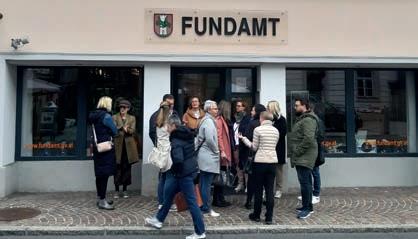

Sabine Kröß-Tunner provided firsthand information about this new service. Following this, Eva Thurnherr shared the experiences gained from a complex modernisation process in Dornbirn with the participants. Lucas Bartl’s contribution regarding the city of St. Pölten’s new electronic notice board also generated great interest among many participants. To conclude this marketplace of ideas, Peter Krusic presented two
After the network meeting is before the network meeting. The next venue has not yet been determined, but it is clear that this successful journey of experience will continue next year. After all: The success story of Austria’s Citizens’ Service Centres as a visible sign to all of the practiced customer and service orientation of munici palities is far from over. We can all continue to look forward to many exciting new developments. •
lectures, but above all visits to service points at the venue – and a lot of room for exchange and for learning from each other. A total of almost 30 people formed a diverse and valuable common pool of knowledge.

On the first day, the focus was on current projects and innovations of the cities present. At the beginning, Klagenfurt showcased the city’s high quality of life with two of its latest image films and presented the scope of the city’s services in a new folder. Gabriele Ambach then provided information about the ongoing modernisation of the teleservice centre of the provincial capital Linz and the current deliberations on a new security concept for the city hall. To cope with a growing number of requests for help as a result of current inflation, a specialised ‘inflation office’ is currently being set up in Innsbruck.
new projects from Graz: the new Tummelplatz service point, designed primarily with and by employees, and the new Reininghaus service point planned for the near future, in which many innovations from the citizens’ service discussion will be implemented, based on international examples (cf. white paper by Klaus Wirth: https://www.kdz.eu/de/ wissen/whitepapers/buergerserviceneu-denken).
The focus of the second day was on visiting service facilities. The first of these was the lost property office of the regional capital, followed by a visit to the new service centre of the state of Carinthia and two more service centres of the Klagenfurt city council: an outsourced service centre for the inspection of building files on the one hand, and the service centre in the city hall on the other.
In 2022, Klaus Wirth discussed new projects in citizens’ service in two podcasts with Marc Groß (KGSt) und Peter Krusic. You can listen to the podcasts at www.kdz.eu/de/ kdzimdialog or on all the major podcast platforms.
Our world of work has changed radically. Change is becoming a constant companion and the speed and complexity of changes are increasing. Overall, the “VUCA world” is characterised by volatility, uncertainty, complexity, and ambiguity. This is currently making itself clearly felt by the recent and current challenges (pandemic, energy and climate crisis, inflation development, glaring labour and skilled labour shortage, etc.) These uncertainties and crises are also leaving their mark on organisations and their employees.

Modern organisations are taking the change seriously and recognising the urgency of breaking new ground in terms of a contemporary leadership and organisational culture as well as agile and adapted ways of working as envisaged, for instance, by the New Work approach. Here, the focus is very much on people, the meaning of the activity, and the relationship between leadership and self-organisation. At the same time, however, this also means decluttering our ways of thinking and accumulated knowledge and throwing the outdated overboard, since the new world of work also makes new demands on learning. Learning and working are inseparably linked and interdependent. In a dynamic world characterised by digitalisation, it is particularly important to learn quickly and effectively. Learning continuously, sharing knowledge, and mutually benefiting from learning partnerships is becoming more important than ever. Effective organisations and leaders actively support their employees in
their own self-development and the development of their potential, and thus in the continued development of the entire organisation. They ensure that silo thinking or knowledge hoarding are prevented by establishing an open learning and working culture in which collaborative work and learning are given first priority. If employees have good opportunities to develop, they are usually more satisfied, engaged, and motivated, and feel more connected to the organisation.
As a training provider, we want to offer the best possible support to the modernisation efforts and training projects of our public sector clients.
We hope you will continue to put your faith in us and continue benefiting from our practice-oriented specialist seminars in 2023, whether in a face-to-face setting on site or live & interactive as a webinar in the cost-saving online learning format. We are gradually expanding our diverse and long-standing learning networks for you.
In 2023, we will continue to offer a wide range of specialist topics and numerous new innovative programmes. Take a look at our spring programme 2023.
www.kdz.eu/de/seminare
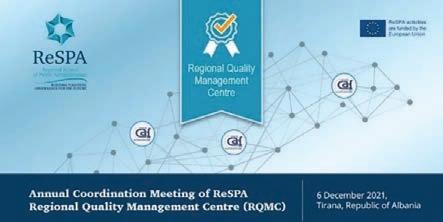
The CAF Centre6 of KDZ has blossomed into an internationally sought-after and recognised CAF centre and was able to further expand its position as a ‘first-contact-point’ on all issues related to CAF, good governance, and administrative innovation in 2022. Important milestones were achieved for further internationalisation of the CAF centre, growth of the CAF network, the continued development of CAF services, and the publication of CAF studies.
A special focus in the activities of the CAF Centre in 2022 has been the involvement of KDZ in a project of the EU Technical Support Instrument (TSI) ‘Strengthening the Resilience of Public Administrationswith the Common Assessment Framework’.

KDZ implemented comparative case studies in eleven European countries on behalf of the OECD on the question of to what extent the Common Assessment Framework supports the resilience of public administrations. This permitted the learning of valuable lessons and the identification of starting points for the further development of CAF.
• CAF strengthens the resilience and agility of public administrations

• Mindfulness and participative leadership are the basis of resilience



• Crisis and risk management plans have proven their value

• Process management is the basis for the rapid adjustment of services



• Digitalisation provided assistance during the pandemic
• Partners are the cornerstones of resilience
Another significant milestone was set as part of the BACID III programme. Based on the successes of BACID II, the CAF Centre of KDZ supports the endeavour of the Regional School of Public Administration to build a Regional Quality Management Centre (RQMC), thus strengthening CAF’s presence in the West Balkans. In 2022, the necessary structures and competencies for handling the CAF quality seal procedure were established and additional CAF implementations and CAF trainings were successfully carried out. •
307 ORGANISATIONS IN THE PUBLIC SECTOR AND NPOS IN AUSTRIA USE CAF.
22 ORGANISATIONS IN AUSTRIA ARE CERTIFIED ‚EFFECTIVE CAF USER‘.
4,160 ORGANISATIONS IN THE PUBLIC SECTOR IN EUROPE ARE REGISTERED CAF USERS.
244 ORGANISATIONS IN EUROPE HAVE BEEN CERTIFIED AS ‚EFFECTIVE CAF USER‘ SINCE 2015.
The CAF Centre opted for digitalisation at a very early stage and was therefore able to offer most of its activities online in 2022, as a result of which it was possible to further expand the international network and collaboration with organisations in Austria and Germany.
The CAF Network Germany-Austria and cooperation with CAF partners on site has been extended gradually. Shared activities and offers in CAF webinars as well as the CAFFEX exchange between the countries were established and further developed.
www.caf-network.eu is a comprehensive knowledge platform on CAF. National and international projects, best practices, CAF contacts, CAF documents, and much more are available on one page.
KDZ trained 15 quality managers and administrative managers from seven countries of the Western Balkans in a certified EFAC programme. This helped grow the community of qualified CAF feedback experts (EFAC).
The expertise of the KDZ CAF team is in international demand for expert lectures on CAF and administrative reform. With the study ‘Strengthening the Resilience of Public Administrations with the Common Assessment Framework’, KDZ has mapped out the effect of CAF on the resilience of public administrations in eleven case studies.
The EFAC Practitioners Network is the first international EFAC Network established by the KDZ CAF Centre that invites globally active EFACs to a regularly moderated exchange on the practice of organisation evaluation according to CAF certification standards.
CAF trainings continued to be held online in 2022. In doing so, KDZ’s reach in the D-A-CH area was further expanded and it became possible to more fully involve international contacts in joint training activities. A customised training programme for quality managers was provided through development of the Certified CAF Facilitator Training.
CAF was implemented successfully in a total of 22 Austrian and international projects.

Abtenau
Adnet
Altach
Altlengbach
Altmünster
Amaliendorf-Aalfang
Ampflwang i.H.
Amstetten
Ansfelden
Arnoldstein
Aschach an der Donau
Asperhofen
Asten
Atzenbrugg
Au am Leithaberge
Bad Aussee
Bad Goisern
Bad Ischl
Bad Radkersburg
Bad Vigaun
Bad Vöslau
Baden
Bad Pirawarth
Bärnbach
Berg
Bergheim
Berndorf
Bludenz
Böheimkirchen
Brand-Laaben
Braunau
Bregenz
Brixlegg
Bruck/Mur
Bruck an der Großglocknerstraße
Brunn/Gebirge
Buchkirchen
Bürmoos
Deutschfeistritz
Dornbirn
Ebenau
Ebreichsdorf
Eferding
Eisenstadt
Elixhausen
Engerwitzdorf
Enns
Erlauf
Fehring
Feldbach
Feldkirch
Fischamend
Fohnsdorf
Frankenburg a. HR.
Frastanz
Frauenkirchen
Freistadt
Frohnleiten
Fürstenfeld
Gänserndorf
Gallneukirchen
Gaming
Gampern
Gars/Kamp
Gaschurn
Gattendorf
Gerasdorf b. Wien
Gloggnitz
Gmünd
Gmunden
Goldegg
Gols
Gratkorn
Gratwein-Straßengel
Graz
Gröbming
Grödig
Grosshöflein
Gumpoldskirchen
Gunskirchen
Guntramsdorf
Güssing
Hallein
Heiligenkreuz im Lafnitztal
Henndorf am Wallersee
Hernstein
Hinterbrühl
Hofamt Priel
Hof bei Salzburg
Hohenems
Hopfgarten
Hofstetten-Grünau
Hornstein
Innsbruck
Irdning-Donnersbachtal
Judenburg
Kaltenleutgeben
Kapfenberg
Kennelbach
Kirchberg-Thening
Kirchdorf a.d. Krems
Klagenfurt
Klausen-Leopoldsdorf
Klosterneuburg
Knittelfeld
Köflach
Korneuburg
Kottingbrunn
Krems
Kremsmünster
Krumbach
Kufstein
Kumberg
Laakirchen
Lamprechtshausen
Landeck
Längenfeld/Tirol
Langenlois
Langenzersdorf
Lassee
Laxenburg
Lanzenkirchen
Leibnitz
Lendorf
Leoben
Leobendorf
Leobersdorf
Leonding
Lichtenau im Waldviertel
Lienz
Liezen
Linz
Loipersdorf
Loosdorf
Luftenberg an der Donau
Lustenau
Magdalensberg
Mannersdorf am Leithagebirge
Maria Enzersdorf
Maria Saal
Mariazell
Markt Allhau
Mattersburg
Mattsee
Mauthausen
Micheldorf in Oberösterreich
Mistelbach
Mitterndorf an der Fischa
Mödling
Mörbisch
Moosbrunn
Mürzzuschlag
Nenzing
Neudörfl
Neuhofen/Krems
Neuhofen/Ybbs
Neulengbach
Neunkirchen
Neusiedl/See
Nickelsdorf
Niederndorf
Nußdorf-Debant
Oberalm
Ober-Grafendorf
Oberndorf in Tirol
Oberpullendorf
Oberwaltersdorf
Oberwart
Olbendorf
Pasching
Passail
Perchtoldsdorf
Persenbeug-Gottsdorf
Perg
Pfaffstätten
Pöchlarn
Pregarten
Prellenkirchen
Pressbaum
Puch bei Hallein
Puchenau
Pupping
Purkersdorf
Rankweil
Regau
Reutte
Rohrbach in Oberösterreich
Rosegg
Rum
Rust/Neusiedler See Saalfelden am Steinernen Meer
Salzburg
Schärding
Scharnstein
Scheibbs
Schladming
Schwadorf
Schwechat
Seekirchen
Semriach
Sieghartskirchen
Spittal/Drau
Sankt Andrä/Lavanttal
Sankt Andrä-Wördern
Sankt Barbara im Mürztal
Sankt Florian am Inn
Sankt Georgen
Sankt Jakob im Rosental
Sankt Johann i.d.Haide
Sankt Johann/Tirol
Sankt Lambrecht
Sankt Peter am Kammersberg
Sankt Peter in der Au
Sankt Pölten
Sankt Thomas am Blasenstein
Sankt Ulrich bei Steyr
Sankt Valentin
Stadl-Paura
Stanz im Mürztal
Stetten
Steyr
Steyregg
Stockerau
Straß in der Steiermark
Straßwalchen
Strobl am Wolfgangsee
Schwertberg
Tamsweg
Taxenbach
Teesdorf
Telfs
Ternitz
Thal
Thalheim/Wels
Traisen
Traiskirchen
Traismauer
Traun
Traunkirchen
Trieben
Trofaiach
Tulln
Tullnerbach
Uttendorf
Villach
Vöcklabruck
Vöcklamarkt
Voitsberg
Vösendorf
Waidhofen/Thaya
Waidhofen/Ybbs
Waidmannsfeld
Wald im Pinzgau
Waldhausen im Strudengau
Walding
Wallern im Burgenland
Wartberg ob der Aist
Weissenbach/Tr.
Wels
Werfenweng
Weyer
Wiener Neudorf
Wiener Neustadt
Wieselburg
Wieselburg-Land
Wilhelmsburg
Wolfsberg
Wolfurt
Wolkersdorf i. Weinv.
Wörgl
Zell am See
Zeltweg
Zwentendorf an der Donau
Zwettl
New members 2022
ARGE der Stadtamtsdirektoren, Lower Austria
BANK AUSTRIA
Federal Chamber of Labour
Erste Bank Sparkassen AG
EURAC Research
GBV – Austrian Federation of Limited-Profit Housing Associations
Krems Municipal Association (Gemeindeverband Krems)
Municipal Association for Waste Management in the Schwechat area
(Gemeindeverband für Abfallwirtschaft im Raum Schwechat)
Zwettl Municipal Association (Gemeindeverband Zwettl)
Federation of Austrian Industry
Carinthian Fire Fighter Association (Kärntner Landesfeuerwehrverband)
Community Management Academy of Lower Austria
Communal Joint Office for Administrative Management (KGSt)
Land Burgenland
Land Carinthia, Dpt. 3 – Municipalities
Land Styria – Dpt. 17 Land and regional development
Land Salzburg – Economy, Tourism and Municipalities Department
Land Vorarlberg – Dpt. Financial issues and auditing
Vorarlberg Court of Audit
Lebenshilfe Bruck – Kapfenberg gemeinnützige GmbH
Lebenshilfe Ennstal
Lebenshilfe Leoben
Lebenshilfe Mürztal
Upper Austrian Court of Audit
Association of Austrian Cities and Towns
Raiffeisenlandesbank Burgenland und Revisionsverband eGen
Raiffeisenlandesbank Niederösterreich-Wien AG
Regionalplanungsgemeinschaft Großes Walsertal
Salzburg Court of Audit
Tyrol Court of Audit
Association of Social Democrats Community Representatives in Lower Austria (Verband sozialdemokratischer Gemeindevertreter in NÖ)
Verein Region Vorderland Feldkirch
Vorarlberg Association of Municipalities (Vorarlberger Gemeindeverband)
Wiener Städtische Versicherung
Matthias Stadler, Mayor of St. Pölten (President)
Stefan Schmuckenschlager, Mayor of Klosterneuburg (Vice President)
Tina Blöchl, Vice Mayor of the City of Linz
Wolfgang Figl, UniCredit Bank Austria AG
Angelika Flatz, CEO Wiener Wohnen Kundenservice GmbH, City of Vienna
Christian Kemperle, Federal Ministry for Arts, Culture, the Civil Service and Sport
Martin Pospischill, Municipal Department of the City of Vienna
Matthias Tschirf, former Director of Ministry of Economic Affairs
Thomas Weninger, Association of Austrian Cities and Towns

ADA – Austrian Development Agency
CAF – European Experts Group
CEMR – Council of European Municipalities and Regions
CEP – European Policy Centre
Cooperation OGD Austria
Council of Europe – Congress of Local and Regional Authorities
Fiscal Advisory Council Austria
Management Forum for Innovative Public Service
Foster Europe
IDM – Institute for the Danube Region and Central Europe
IFIP – Department of Public Finance and Infrastructure Policy of TU Wien
KGSt – Communal Joint Office for Administrative Management
KMA – Knowledge Management Austria
Kompetenzzentrum für Alltagsökonomie (Competence Centre for Foundational Economy)
NALAS – Network of Associations of Local Authorities of South East Europe
OECD – Sigma
ÖVG – Österreichische Verwaltungswissenschaftliche Gesellschaft
PA 10 – EU Strategy for the Danube Region
RESPA – Regional School of Public Administration
UCLG – CIB – Capacity and Institutions Building (United Cities and Local Governance)
VÖWG – Austrian Association for Public and Social Economy, Vienna
WIFO – Austrian Institute for Economic Research
Elisabeth ALBER, EURAC Research, Bolzano
Peter BIEGELBAUER, AIT Austrian Institute of Technology GmbH
Professor Geert BOUCKAERT, Public Governance Institute of KU Leuven
Stefan BRUCKBAUER, Bank Austria
Professor Peter BUSSJÄGER, University of Innsbruck, Institute for Public Law, Constitutional and Administrative Studies; Institute for Federalism
Professor Franziska CECON, University of Applied Sciences, Linz
Professor Thomas DÖRING, University of Darmstadt
Professor Michael GETZNER, TU Wien, Public Finance and Infrastructure Policy
Marc GROSS, KGST Cologne
Peter GRÜNENFELDER, Avenir Suisse
Martin HAIDVOGL, Chief Executive Director, City of Graz
Florian HAUSER, Policy Officer DG Near, European Commission
Professor Gerhard HAMMERSCHMID, Hertie School of Governance, Berlin
Alfred HEITER, Federation of Austrian Industry
Professor Dennis HILGERS, Johannes Kepler University of Linz, Institute of Public and Nonprofit Management
Klemens HIMPELE, CIO City of Vienna
Petra HIRSCHLER, TU Wien, Institute of Spatial Planning
Professor Michael HOLOUBEK, WU Vienna, Institute for Austrian and European Public Law
Mario HOLZNER, Vienna Institute for International Economic Studies (WIIW)
Friedrich KLUG, Institute for Municipal Sciences, Linz †
Thomas KOSTAL, WU Vienna, Institute for Public Sector Economics
Michael KREMSER, City of Vienna, Municipal Department 5 – Financial Affairs
Professor Andreas LADNER, University of Lausanne, Swiss Graduate School of Public Administration
Stefan August LÜTGENAU, Foster Europe, Foundation for Strong European Regions, Eisenstadt
Professor Verena MADNER, WU Vienna, Department of Socioeconomics, Research Institute for Urban Management and Governance
Heidrun MAIER-DE KRUIJFF, Austrian Association for Public and Social Economy, Vienna
Markus MATSCHEK, Chief Executive Director, Office of the Carinthian Government
Professor Ines MERGEL, University of Konstanz, Department of Politics and Public Administration
Professor Renate MEYER, WU Vienna, Institute for Organisation Studies
Professor Jan-Hinrik MEYER-SAHLING, University of Nottingham, School of Politics and International Relations
Bernhard MÜLLER, Urban Forum
Professor Ulf PAPENFUSS, Zeppelin University Friedrichshafen, Chair of Public Management & Public Policy
Professor Marga PRÖHL, Federal Ministry of the Interior and Speyer University
Sebastian SCHÄFFER, Institute for the Danube Region and Central Europe (IDM)
Margit SCHRATZENSTALLER-ALTZINGER, WIFO Vienna
Tobias SCHWEITZER, Vienna Chamber of Labour
Professor Kathrin STAINER HÄMMERLE, Carinthia University of Applied Sciences
Professor Erich THÖNI, University of Innsbruck
Mario WIEDEMANN, Bertelsmann Foundation, Livable Communities
Professor Jurgen WILLEMS, WU Vienna, Institute for Public Management und Governance
2023 will see a new edition of the publication ‘Österreichs Städte in Zahlen” (Austria’s cities in figures) of the Austrian Association of Cities and Towns. This publication, already the fourth in the series, will again open a window onto many insights into the work of cities in Austria. A total of nine thematic areas will be presented: from population to local economy, social and cultural life, municipal finances, education, health care, mobility, and various environmental/climate aspects. To ensure that we would be able to hold the publication in our hands in good time, we began to define central data and new content as early as in autumn 2021, in cooperation with the Austrian Association of Cities and Towns and a small editorial team consisting of representatives from larger cities. New features include a stronger focus on climate and expanded information on the structure of municipal administrations.
In this day and age of rapidly advancing digitalisation in all areas of our lives, one would think that a publication like this would more or less create itself in just two or three clicks. Unfortunately, this is not the case, not even in 2022. While large international corporations such as Google, Amazon & Co. continue to amaze us with insights into our preferences by drawing on their almost frighteningly large databases, collecting and processing data about cities and municipalities in Austria is more like hunting for mushrooms on a long autumn walk. Sometimes you are lucky and the basket fills up almost by itself; yet often the basket remains empty even after a long ramble, or what you find turns out to be inedible in the end.
This is more or less what things were like for us again this year during our foray through the virtual ‘data forest’. Again, data management meant manual collecting and not drawing from a virtually unlimited electronic data reservoir like the ones mentioned above. Often, we searched for the information in a multitude of different sources, like hidden mushrooms in a forest, found it, and then systematically processed it for the nine thematic fields. The two most important pillars of information procurement were a survey of the cities on the one hand and recourse to existing statistics (or commissioned special evaluations) on the other hand – primarily from Statistics Austria and other public institutions.
Now, at the end of 2022, the information tables are complete and final quality control processes are still being run. And ultimately, things are a bit like mushroom hunting. Once the mushroom stew is on the table and the scent of the forest spreads through the home, any hardships (or perhaps an aching back after all the toil and hard work) are forgotten and it is time to celebrate the joint success.
We would like to again thank all the people in the cities and municipalities and our partners who have supported us and helped us create this unique publication of the Austrian Association of Cities and Towns. Take a look for yourself in the coming year and open this window into the exciting world of cities and municipalities.
Soon, after ÖStiZ may again be before ÖStiZ. And maybe in a few years’ time, we will have come noticeably closer to that simple click and those ‘data mushrooms’ will simply fall at our feet. After all, it’s alright to indulge is wishful thinking sometimes.
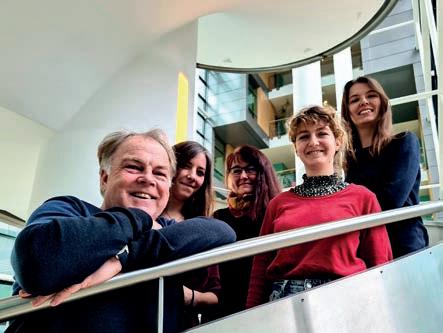
The transparency platform www.offenerhaushalt.at, which has now been in existence for nine years, continued its success story in 2022. In addition to the municipalities already activated, 124 new municipalities joined in the course of the year, so that 1,414 Austrian municipalities had published their financial data on the platform by the end of 2022. This corresponds to more than two thirds of all Austrian municipalities. In other words, about 7.5 million Austrians or about 85 percent of all Austrian citizens live in cities and municipalities with transparent data on www.offenerhaushalt.at.
By providing municipal financial data on the transparency platform www.offenerhaushalt.at, the data is automatically visualised in several different ways. On the one hand, the municipality benefits from this, as the visualisations can be used, for example, in municipal council meetings, in the municipal newspaper or by municipal employees or municipal representatives, and on the other hand, the public benefits, as interested citizens can take a closer look at the finances of their own municipality.
In addition to the standard visualisations, there are also special visualisations on the platform, such as
the digital funding and transfer report or the subsidy checker. Last year also saw the addition of special visualisations by a number of municipalities, with 32 municipalities now publishing Digital Funding and Transfer Reports on the platform.
In spring 2022, the financial KDZ Quick Test and the KDZ Quick Test NEW were successfully integrated on the platform. They calculate two sets of key figures automatically, based on the municipalities’ financial statement data. The presentation of the five key figures included in the financial KDZ Quick Test was revised and the new key figures of the KDZ Quick Test NEW, relating to the profit and loss budget and the asset budget, were introduced on the platform. Both sets of indicators are aggregated into an annual overall score for each municipality. The overall score shows the respective municipality’s credit standing.
For 2023, the platform is to be expanded to include the municipal associations. This means that in addition to all the municipalities, all the municipal associations will be invited to register their municipal association on www.offenerhaushalt.at and publish their financial data on the platform. This extension is to be implemented by summer 2023. •
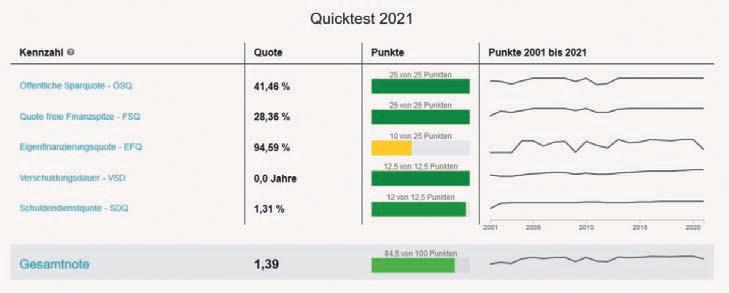
The Austrian Agency for Research Integrity (ÖAWI) was established as an association at the end of 2008. It raises awareness for the standards of good scientific practice among scientists as well as the general public. The Agency strengthens responsibility in research and ensures the observance of the respective guidelines.
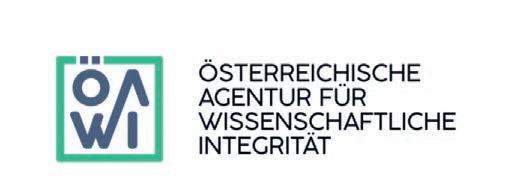
All the Austrian public universities, several private universities, universities of applied sciences as well as various non-university research institutions and research funding organisations are among its members
The platform is a digital service for cities and municipalities provided by the Association of Cities and Towns and KDZ, through which they can educate themselves on sustainability topics, the 2030 Agenda, and the SDGs, as well as learn from each other and network. Interested cities and municipalities can request an invitation link via KDZ.
The website www.stadtregionen.at was expanded by the chapter ‘Climate and Energy’ and offers indicators and visualisations on energy and land consumption as well as other climate-relevant factors for Austria’s urban regions.
The KDZ Quick Test on the www.praxisplaner.at platform was given a rehaul in 2022. The correction of transfers between operational and investment expenditure was changed, and several adjustments and updates to the tool were made.
In addition, the KDZ tools for the valuation of employee provisions and the generation of management reports (KDZ Vermögensbewerter Personalrückstellungen and KDZ Managementbericht), which are popular among users, were continuously updated and revised.
A reload of the investment and project planner is scheduled for 2023. The KDZ Investment and Project Planner is a tool for medium-term investment planning and coordination with medium-term result and financial planning. The tool provides support in planning investment costs and follow-up costs and in planning the financing of investment projects. In addition, the new investment and project planner will show the effects on the profit and loss budget as well as on the financing budget.
To support CAF organisations, we have developed the CAF Monitoring tool. It enables the tracking, fine-tuning and monitoring of the implementation of the CAF Action Plan. The new tool will improve the effectiveness of CAF and strengthen the quality and governance of public organisations.

INFORMATION & ORDERING
Martina Henickl
Anna Schubert
bibliothek@kdz.or.at
Council of European Municipalities and Regions (in cooperation with KDZ): Local Finances and the Green Transition Brussels, 2022.
Krisenfester Finanzausgleich.
Mitterer, Karoline; Hochholdinger, Nikola; Seisenbacher, Marion: Fact Sheets:
Elementare Bildung. Grundlagen und Finanzierung.
Fact sheets: primary education. Basics and financing Vienna, 2022.
Crisis-proof financial equalisation Vienna, Graz, 2022.
Biwald, Peter; Mitterer, Karoline; Seisenbacher, Marion; Pichler, Dalilah: Stadtdialog. Österreichische Gemeindefinanzen 2022 –Entwicklungen 2009 bis 2020 sowie Ausblick. City dialogue. Austrian municipal finances 2022 – developments 2009-2020 and outlook Vienna, 2022.
Mitterer, Karoline; Hochholdinger, Nikola; Seisenbacher, Marion: Ausbaupotenziale in der schulischen und außerschulischen Tagesbetreuung. Status Quo und Voraussetzungen für einen weiteren Ausbau. Potential for the expansion of daycare in and outside of school. Status quo and requirements for further development Vienna, 2022.
OUR OFFICE IS LOCATED IN VIENNA.
KDZ – Centre for Public Administration Research
Guglgasse 13, 1110 Vienna
Telephone: +43 1 8923492

E-mail: institut@kdz.or.at
www.kdz.eu
Stay up to date, discuss with us and follow us on facebook.com/kdz.or.at twitter.com/KDZ_Austria www.linkedin.com/company/KDZ www.instagram.com/kdz_austria/
7,123 SUBSCRIBERS RECEIVE OUR NEWSLETTER
10 times a year
KDZ PLATFORMS
praxisplaner.at offenerhaushalt.at caf-zentrum.at bacid.eu stadtregionen.at verwaltungskooperation.at
MEMBER SERVICES
www.kdz.eu/en/kdz/membership
Our members benefit from special services and discounted rates. We assist in nurturing relationships with member municipalities, public sector organisations and and institutions and strengthen your network.
Association office: Birgit Frank, frank@kdz.or.at
KNOWLEDGE CENTRE
www.kdz.eu/en/knowledge
An extensive literature and library service is available to our members.
Contact us: bibliothek@kdz.or.at
NEWSLETTER
www.kdz.eu/en/kdz/newsletter 10 times a year
We highlight current topics in the public sector and offer insight into our work. Subscribe to our free newsletter on our website
KDZ English newsletter 6 times a year
Subscribe link: https://eepurl.com/dfXF9f
FORUM PUBLIC MANAGEMENT

www.kdz.eu/de/wissen/fpm
Our professional journal ‘Forum Public Management’ covers key topics twice a year.










